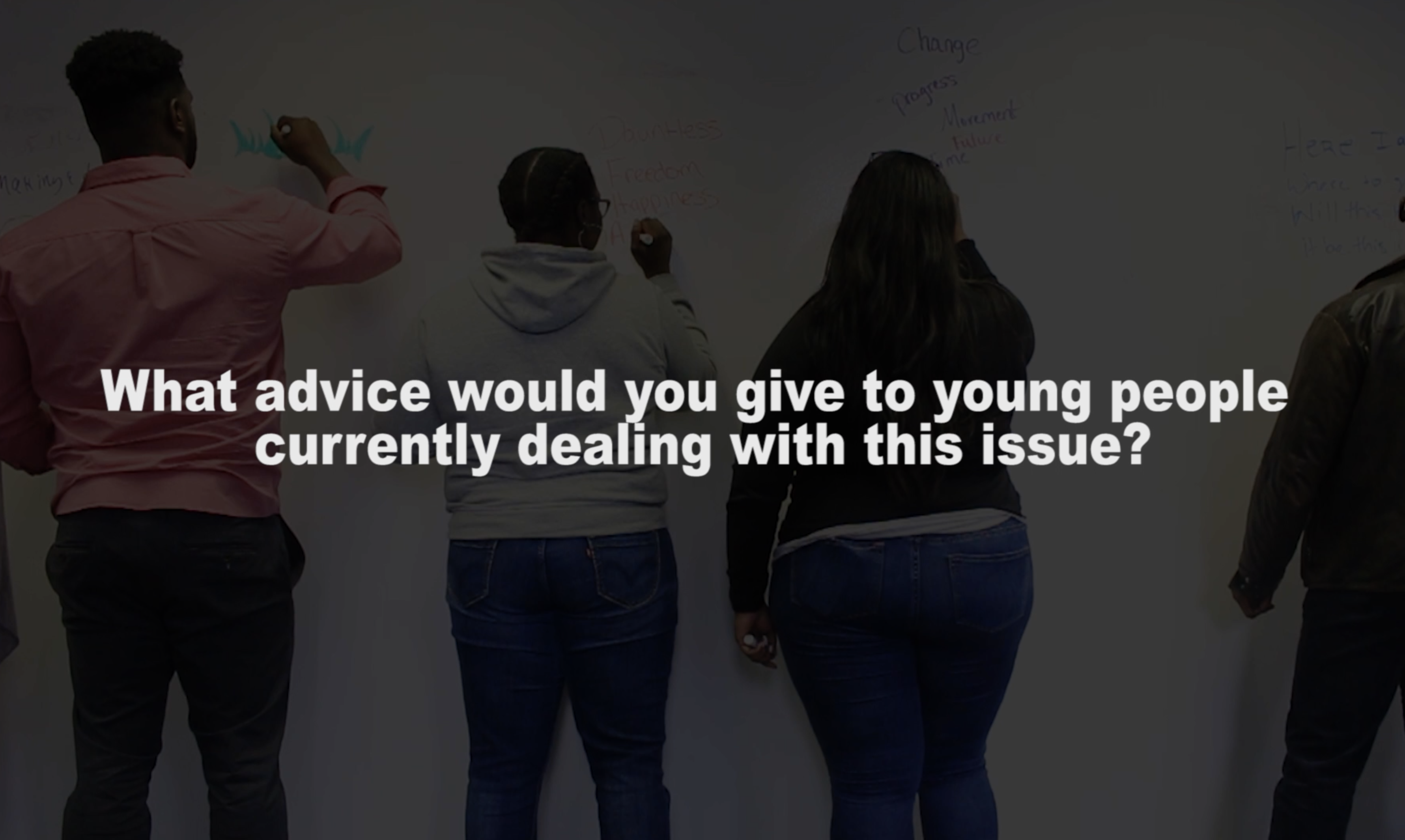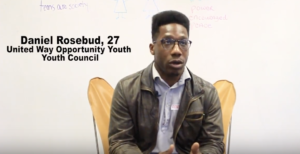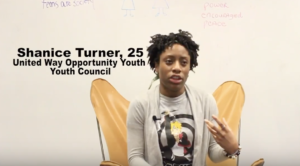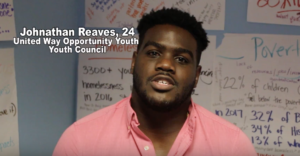When Shanice Turner attended high school in Waukegan, Illinois, her classroom population was filled with diversity, yet there was little opportunity for her and her classmates to prosper. Turner, now 25, says her school was overpopulated, which resulted in many of the leadership programs she cared about being cut. “The room would try to squeeze in about 60 young people,” she described, “…just to pass them on because the incentive [for the school system] is that the more high schoolers and young people passed on, the more money they get in return.” Turner says she was unable to develop the leadership and social skills she aspired to have. “I became an ‘opportunity youth’ because I wasn’t allowed to think in school or even think about my education,” she said.
Turner was one of millions of young adults who were disconnected from school and work — and lack skills and connections to move forward socially and economically.
According to Measure of America, a nonprofit research group, “disconnected youth” refers to young people who between the ages of 16 and 24 who are not enrolled in school or employed. Roughly 4.8 million youth fall under this category — 78,800 in metro Atlanta, or 11 percent of young adults in that age range, according to U.S. Census data from 2016 compiled by Measure of America.
Disconnectedness is an ongoing issue, causing hardship and obstacles that prevent young adults from the path to self-sufficiency as they transition into adulthood. Today, a group of advocates and leaders aims to replace the aged expression “disconnected youth,” with the updated term “opportunity youth,” as it refers to young individuals who “have the potential in the world to do what they’d like to do … but the opportunity to establish that life is not necessarily readily accessible to them,” said Daniel Rosebud, a member of the United Way of Greater Atlanta Opportunity Youth Initiative Youth Council.
Johnathan Reaves, a 24-year old math teacher who volunteers on the Youth Council, said the organization strives to “bridge the gap between youth and bring them to college and or career. They help to eliminate barriers by providing resources so youth can reconnect themselves and establish a better life when equipped with the skills necessary to be successful.”
To bring awareness about “opportunity youth” and the experiences of those who have overcome the challenge of “disconnection,” several members of the Youth Council visited VOX to share how they’re trying to make a difference for teens and young adults today.
Daniel Rosebud, 27: I was also a student of the programs that helped opportunity youth. Especially going to an Atlanta public school, Atlanta always seemed to have more resources than other counties did… with programs that would educate you early on in high school about college opportunities. Summer programs were also offered for career building, and knowing that these same programs helped me to craft my career, I would love to give back to the same population of people. I am a graduate of Year Up, a program that pushes young adults to a career or college in within a span of one year. With this program, I found stability, and being one of the most stable people in my family, I hope to help others with their futures by connecting them to the right people.
Shanice Turner, 25: The hardest part of my experience was trying to step out and be myself because my accent was definitely not from Waukegan or Atlanta, so speaking out and being myself was the most difficult part. I didn’t have social skills, so I didn’t know how to be around people my own age. I really had to push myself out of being awkward. I didn’t like people pushing me originally and putting me on the spot. I didn’t like people wanting me to do better because I didn’t think I could do better myself. But then it hit me when something happened, and I questioned myself, “I did that? What else can I do?” After moving to Atlanta, I’ve never felt such a courageous spirit to leave everything including my family and friends in Waukegan. Despite [the departure], I always go back and help the community there too. My advice to teens currently experiencing this issue is to stay strong as Rome was not built in one day. Believe that you have the power to change the world. I never thought I’d be sitting here in this interview, but here I am today. I was the girl who was very sheltered and shy, so self-expression wasn’t there. Yet here I am. I am able to push myself and gain momentum to do all these other things. Be patient with yourself because it may seem like it is taking a long time, but this is your process… and this is your story… and by that, write your story. Write the dreams you want to pursue. Be consistent and practice it every day so that the future you can look back, smile, and be proud.
Johnathan Reaves, 24: I wanted to inspire and motivate young people, and get them from thinking that they can do something to knowing that they can do something. I want to have them know that they have the power inside to be more than just a statistic and that they can make a difference within their lives and the lives of other people. … I want to change the stigma that was created that you can either “love a black man or fear a black man.” I want to be the light and be an example to inspire others to change the stigma. The lack of connectedness to opportunity, such as a better networking community, a better environment, a better socioeconomic status, etc. can contribute to the barriers young people face that prevent them from moving forward. As a teacher in public education, you can really see the difference in a school system. Not all schools have the same opportunities when it comes to access… some books may be better than others… Even though education is not separate, not all education is equal, and I hope to change that.
After hearing these individuals’ powerful stories, we asked them what advice they would give to teens and young adults currently facing disconnectedness and what their initiatives are to help combat this issue for the future.
He advises young people to “prepare to not be prepared and to understand as much about yourself and your surroundings as possible… Stay informed. Don’t hang around people that look for excuses to be mediocre. Be able to find out what’s going to drive you and be okay with the process. Don’t be afraid of the stigmas of getting help and getting the education needed.”
What needs to change in Atlanta so youth are more connected to opportunities?
Daniel Rosebud: The issue itself stems from the country trying to step up its responsibility about pushing employers and educators together to realize more traditional and nontraditional ways of educating and employing, giving them more access and opportunity. … I hope to affect the quality of standards people have to employ while they develop programs in their region. One of my projects would be to develop a mentor relationship to create a pathway to construct a unique advocacy training.
Shanice Turner: We should break down the communication barrier that exists. We want young people to come to us, when really we should be coming to them. I want young people to be the change advocates for their cities and taking advantage of the opportunities out there that are meant to help them. I am working on the 100K initiative… which is a job fair that is going to be hosted [May 3] to hire young people on the spot. We want to help them come professionally dressed, ready to go, and ready to chase after their futures.
In a society where it is common to complain about our so-called first-world problems, youth who face disconnectedness lack the basic needs needed to transition into independence as young adults. America’s overabundance contrasts considerably with the trough of young people who face disconnectedness on a daily basis with a shortage of money, access to education or employment, but never a shortage of determination.
Resources for “Opportunity Youth”
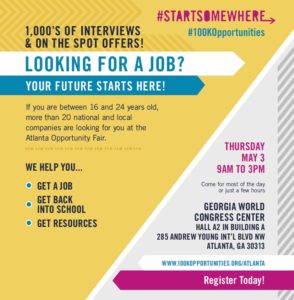 100K Job Fair – May 3, 9-3 p.m. Georgia World Congress Center
100K Job Fair – May 3, 9-3 p.m. Georgia World Congress Center
Register at http://bit.ly/100kATLfairVoxAtl
United Way Youth Opportunities Initiative – Contact Michele Jacobs (mjacobs@unitedwayatlanta.org) for information about joining the youth council.
Year Up Greater Atlanta is a one-year job training program for low-income young adults (ages 18-24) that includes internships, classes that can count for college credit and “wraparound support.”
Get Schooled’s #startsomewhere campaign helps “young people find supports, explore opportunities, and tell their stories of success.”
WorkSource Atlanta S.T.E.P. Forward “aims to provide Atlanta youth with work readiness, training, financial literacy workshops and skills assessment.”
Job Corp: Although Job Corps boats being the “largest free residential education and job training program” in the U.S., the Atlanta center is currently closed, “pending constructing of a new Job Corps facility,” per the organization’s website. The organization invites youth ages ages 16 to 24 to apply anyway for placement elsewhere. Contact 800-733-JOBS (5627).
 Avanti, 17, is a junior at Johns Creek High School.
Avanti, 17, is a junior at Johns Creek High School.

